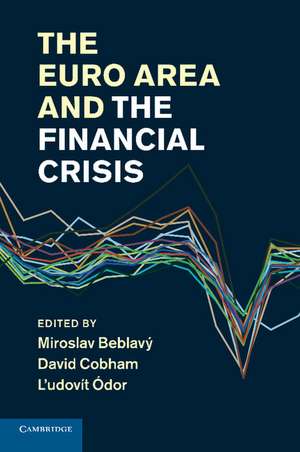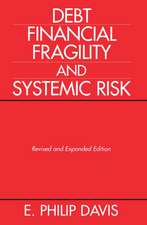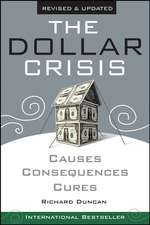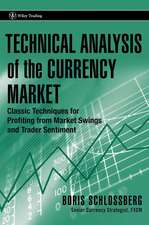The Euro Area and the Financial Crisis
Editat de Miroslav Beblavý, David Cobham, L'udovít Ódoren Limba Engleză Paperback – 5 mar 2014
| Toate formatele și edițiile | Preț | Express |
|---|---|---|
| Paperback (1) | 421.28 lei 43-57 zile | |
| Cambridge University Press – 5 mar 2014 | 421.28 lei 43-57 zile | |
| Hardback (1) | 786.15 lei 43-57 zile | |
| Cambridge University Press – 5 oct 2011 | 786.15 lei 43-57 zile |
Preț: 421.28 lei
Nou
Puncte Express: 632
Preț estimativ în valută:
80.61€ • 84.38$ • 67.09£
80.61€ • 84.38$ • 67.09£
Carte tipărită la comandă
Livrare economică 31 martie-14 aprilie
Preluare comenzi: 021 569.72.76
Specificații
ISBN-13: 9781107673007
ISBN-10: 1107673003
Pagini: 372
Ilustrații: 56 b/w illus. 48 tables
Dimensiuni: 152 x 229 x 20 mm
Greutate: 0.49 kg
Editura: Cambridge University Press
Colecția Cambridge University Press
Locul publicării:New York, United States
ISBN-10: 1107673003
Pagini: 372
Ilustrații: 56 b/w illus. 48 tables
Dimensiuni: 152 x 229 x 20 mm
Greutate: 0.49 kg
Editura: Cambridge University Press
Colecția Cambridge University Press
Locul publicării:New York, United States
Cuprins
List of figures; List of tables; List of boxes; List of contributors; 1. Introduction Miroslav Beblavý, David Cobham and Ľudovít Ódor; 2. Towards a new architecture for financial stability in Europe Athanasios Orphanides; Part I. The Experience of the Crisis: 3. Weathering the financial storm: the importance of fundamentals and flexibility Thorvardur Tjörvi Ólafsson and Thórarinn G. Pétursson; 4. The Irish crisis Philip R. Lane; 5. The crisis in Spain: origins and developments Angel Gavilán, Pablo Hernández de Cos, Juan F. Jimeno and Juan A. Rojas; 6. The financial crisis and the Baltic countries Aurelijus Dabušinskas and Martti Randveer; Part II. Accession to the Euro Area: 7. The road to euro adoption: a comparison of Slovakia and Slovenia Biswajit Banerjee, Damjan Kozamernik and Ľudovít Ódor; 8. Is the euro really a 'teuro'? The effects of introducing the euro on prices of everyday non-tradables in Slovakia Miroslav Beblavý; 9. The euro's contribution to economic stability in Central, Eastern and Southeastern Europe: is euro adoption still attractive? Ewald Nowotny; 10. Is the euro still attractive for CEE countries? Zdeněk Tůma and David Vávra; Part III. The Future of the Euro Area: 11. Why the current account may matter in a monetary union: lessons from the financial crisis in the euro area Francesco Giavazzi and Luigi Spaventa; 12. National fiscal rules within the EU framework Daniele Franco and Stefania Zotteri; 13. The road to better resolution: from bail-out to bail-in Thomas F. Huertas; 14. Financial stability and monetary policy: lessons from the euro area Laurent Clerc and Benoît Mojon; 15. Is there a case for price level targeting? Boris Cournède and Diego Moccero; 16. Heterogeneity in the euro area and why it matters for the future of the currency union Wendy Carlin; 17. How to regain confidence in the euro area? Vítor Gaspar; 18. How to regain confidence in the euro area Stefan Gerlach; 19. How to save the euro? Lessons from the US Jacques Mélitz; Index.
Recenzii
'The euro area is in the throes of an existential crisis. Understanding how it can get out requires first understanding how it got in. This book provides the essential background on the onset of the crisis, complete with national variations, before describing what European policy makers should do next. One can only hope that they heed the authors' advice.' Barry Eichengreen, George C. Pardee and Helen N. Pardee Professor of Economics and Political Science, University of California, Berkeley
'A large collection of analyses by many of the best economists. The topic is burning, the discussions go right to the heart of the matter and all big issues are included. Rush to read this book because it deals with front-page news and because things change so fast.' Charles Wyplosz, Professor of International Economics and Director of the International Centre for Money and Banking Studies, The Graduate Institute, Geneva
'A large collection of analyses by many of the best economists. The topic is burning, the discussions go right to the heart of the matter and all big issues are included. Rush to read this book because it deals with front-page news and because things change so fast.' Charles Wyplosz, Professor of International Economics and Director of the International Centre for Money and Banking Studies, The Graduate Institute, Geneva
Descriere
This book shows how the world financial crisis has struck the euro area and examines policies to ensure its future viability.














